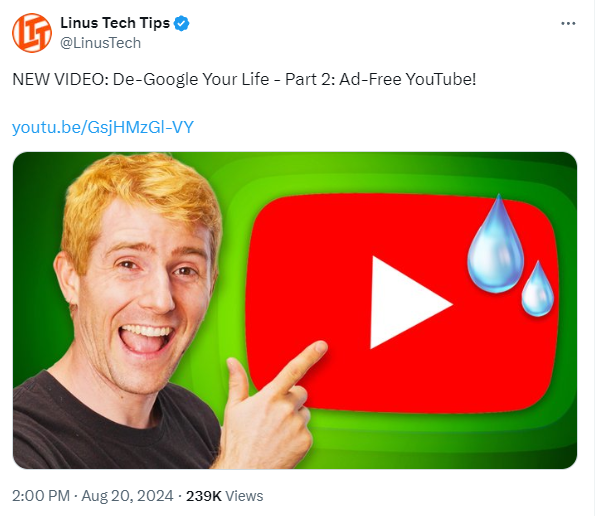https://files.catbox.moe/a6111d.png / https://nitter.poast.org/LinusTech/status/1825956050685800834

If you go the video, https://www.youtube.com/watch?v=GsjHMzGl-VY. You will see it’s gone. So Youtube being Youtube.
Here’s a Odysee mirror of the video, https://odysee.com/@jopec:7/linus-tech-tips-degoogle-your-life-part-2-adfree-youtube:0.


That’s not the same because the advertisement company has already paid the content creator.
Creators also get paid for in video ad reads and product placement. Media providers also make money on data collection regardless of the ads you skip. And furthermore advertising prices have always been based an statistics of reach. Companies like youtube have clearer data than the old Nielsen ratings but they’ve had a pretty accurate numbers of how many users skipped ads through time shifting too that have only gotten better since.
It legally is not piracy in most places. Ethically just watching they are probably making money off of you even if you skip the obvious ads but if you really want to go over the top you could still skip and just find other ways to give money to the platform or creator.
If it’s funded by live ads and the ads fund the creators, then skipping the ads means skipping your payment.
It’s not legally piracy, but it’s the same spirit and the effects are indistinguishable on the creators.
This is nonsense. Your argument is that you’re a pirate if one corporation with no relation to the content fails to pay a corporation which distributes but does not own the content. If you watch an ad then the advertising company refuses to pay you do not suddenly become a pirate.
If a struggling McDonald’s franchise fails to pay some franchisee fee that does not mean you pirated your big mac.
I don’t see how your example is even vaguely similar to mine, and the fact that you used that as an example means you don’t understand my argument.
A little ham-fisted, sure, but if you think it’s irrelevant you evidently didn’t take any time to actually think about it (you did also reply instantly, so I’ll take that over you lacking reading comprehension).
I’ll simplify.
Digital piracy is illegal copying of unlicenced content.
Alice creates content.
Alice licences the content to Bob.
Bob decides to distribute the content with advertisements from Charlie.
You download the content.
Charlie does not pay Bob.
You did not breach any licences.
You did not pirate the content.
And just to further clarify, Alice is the person who made a video, Bob is Youtube, Charlie is an advertiser. Your argument is not an ad is piracy if “the advertisement company [hasn’t] paid the content creator.” The advertiser pays the distribution company, and the relationship between those two companies is irrelevant. The advertiser failing to pay does not retroactively turn you into a pirate.
The whole argument is pointless in the first place, it’s irrelevant whether or not you consider ad blocking to be technically piracy. A sensible adblock argument would be around the ethics of manipulation versus payment, or security versus whatever it is advertisers want. Arguing semantics doesn’t matter.